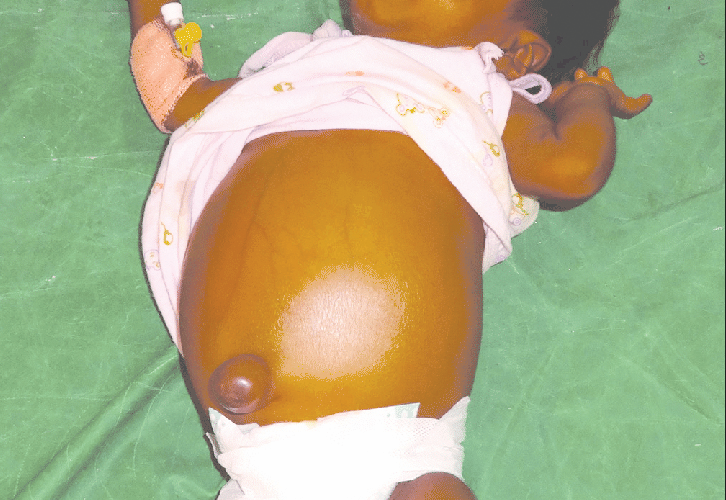Paediatric hernias: Easy to diagnose, yet fear to seek treatment rife

Parents often get stressed out when their children become sick; they will do anything to make sure they have a healthy life.
When Rael Ndende’s daughter was admitted for umbilical surgery at Kenyatta national Hospital (KNH) on October 24 this year, one could not fail to notice the sadness written all over her face.
Precious Joy, her daughter, had undergone the surgery, but took some time to wake up, unlike in ordinary circumstances where patients wake up and are released earlier. This delay was due to failure by the family to seek treatment as soon as they learnt about the problem.
To their relief, Joy emerged from the operating theater at around 10pm, about 10 hours later. The surgery had gone through successfully except she felt some dizziness.
“We discovered that Joy had umbilical hernia at the age of six months in 2011, I took her to several clinics, but nothing was done about it. She was then referred to KNH for surgery, but I developed cold feet at the idea of my fragile baby going through a surgical procedure,” she recounts.
“I decided not to take her to hospital until 2021 when I realised that the situation had gotten worse. I eventually took her to KNH where they screened her and I was advised that an urgent surgery was needed to correct the problem,” she adds.
An umbilical hernia occurs when part of the intestine bulges through the opening in the abdominal muscles near the bellybutton (navel). They are common and in most cases harmless.
She says the situation had gotten so bad that her daughter’s teachers had to send her home because she couldn’t concentrate in class. Furthermore, she faced difficulties when she needed to use the restroom.
“After I visited the hospital for testing, doctors called me on a Wednesday and asked me to bring my child the following day, and she was immediately admitted. I was still hesitant even at this point, but the hospital offered me counselling. I regret delaying this surgery. I would have lost my daughter, “ she adds.
Ndende adds, “First of all parents need to accept that that umbilical hernia is real and is treatable. I was in denial at first, but I am glad I accepted and we got help. It wasn’t a good idea for me to wait for 12 years to seek treatment. When the doctor tells you something, it is wise to follow their advice.”
Patrick Musyoka shares a different story. His nine-year-old son had an undescended testicle, a condition he discovered when the child was six years old. Despite being advised to seek treatment at every local clinic he visited, he didn’t have the courage to take his son for surgery.
Vomiting and headache
As the condition worsened, making it difficult for the boy to walk or sleep, he eventually decided to take him to KNH to see if his son could get help.
An undescended testicle is when a testicle doesn’t move down into its proper place in the scrotum before birth. They are almost always associated with hernias. If the testis does not descend completely, the hernia does not close and carries the same risks as any other hernia in the groin (or inguinal hernia). “We had visited all the clinics in our village, and they all advised that the child needed surgery, something that frightened me. I didn’t have the money for the operation, which I thought would exceed Sh100,000. I ignored it, not knowing that my child was hurting,” he notes.
He says that his son’s scrotum kept on enlarging, making him uncomfortable. However, after undergoing surgery, he started feeling better. There was some vomiting and a severe headache, which prompted the doctors to keep him in the hospital for monitoring and provide medication to ease the pain.
Musyoka adds, “Doctors told me that my son could have been discharged from the hospital the same day he was operated on if he had come in earlier. But I was afraid. It took a lot of convincing and assurance that I had nothing to worry about.”
He was pleasantly surprised when the surgery took only five hours, with Philip Mwendwa, his son, coming out safely.
Dr Syvovata Munyalo, a paediatric surgeon and the organiser of the Hernia and Undescended Testis Surgical Camp at KNH, which ran between October 23 and 27, says that when it comes to illnesses that require surgery, parents often tend to stay away from them. This may be due to financial constraints given surgeries are relatively expensive or the belief that the surgery won’t be successful, possibly influenced by reports of people dying after undergoing surgery or botched procedures. Some parents may also assume that the child will outgrow the problem miraculously, not realising that they are putting their child’s life at risk.
She describes hernia as when part of the intestine pokes through an opening in the abdominal wall near the belly button. The intestines move in and out of the opening, but there’s a risk that they can get in and get stuck. If it stays for a long period, the intestines might lose blood supply.“If they get stuck, it becomes an emergency because it can lead to vomiting, constipation, and abdominal distension. In such cases, we admit the child, prepare them, and take them to the operating room, the cost of that is that we have to reset that path, the operation is much more significant than that; the complications can worsen, making the patient very sick,” she notes.
Dr Praxades Okutoyi, a paediatric anaesthesiologist at KNH says if the undescended testes are not treated early. She emphasises the need to identify this condition early because it can be present from birth. It is essential for parents to bring in their affected children to prevent unnecessary complications in the future.
“All these conditions are critical if not treated early. Also, make sure to entrust your child to an expert surgeon, because there is a specific technique for the operation. We have had cases where people returned with complications after previous surgeries. It’s best to address it as soon as you notice it,” she remarks.
She says it’s better for parents to bring their children for screening, so that experts can determine whether the child is okay or if further intervention is necessary. In the case of untreated hernias in children, it can lead to complications such as incarceration, where a loop of intestine becomes trapped in the hernia sac, causing severe pain and potential damage to the intestine. This can be a medical emergency.
Potential complications
She adds that undescended testes, on the other hand, may not always cause pain on the child, but they can lead to several problems if left untreated. Complications can include fertility issues, an increased risk of testicular cancer, and psychological stress due to the physical appearance. The severity and frequency of pain can vary depending on the individual case and its complications.
“It’s important for parents to consult with health care professionals and follow their recommendations to ensure early treatment and prevent potential complications in children with these conditions,” she highlights.
According to various research, undescended testis is relatively common, occurring in approximately three out of 100 to one out of 20 male babies. Babies born prematurely (before 37 weeks of pregnancy), those who are small for their gestational age, have low birth weight, and have a family history of the condition are at a higher risk of developing undescended testes.
Okutoyi says undescended testes often don’t exhibit noticeable symptoms, and when they do, the symptoms can vary from one child to another. The most common indication of undescended testes is when a health care provider cannot feel the testes during a physical examination.
Treatment for this condition depends on factors, such as the child’s symptoms, age, and overall health, as well as the severity of the condition. In many cases, the testis naturally descends into the scrotum by the age of three months, and by six months in most cases, without requiring any treatment.
However, in some situations, treatment may be necessary. This can involve surgery, known as orchiopexy, to move the undescended testicle into the scrotal sac. Orchiopexy is typically performed between the ages of 6 and 18 months and is effective for most children.
In rare instances, hormone therapy may be used to stimulate the body to produce testosterone, which can aid in the descent of the testes into the scrotal sac. The use of hormone therapy is limited to specific cases, and parents should discuss its risks, benefits, and potential side effects with their child’s healthcare providers.


